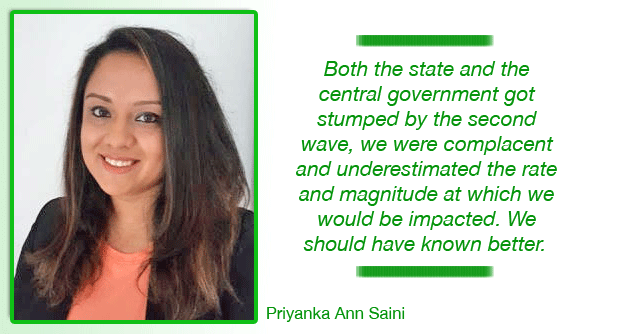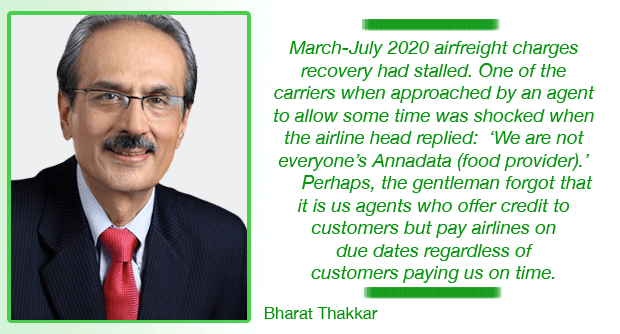|
FlyingTypers spoke to two professionals, one a marketing specialist
and mother, and the other, a veteran forwarder to hear how they had been
affected by the pandemic.
 |
PRIYANKA ANN SAINI, is Chief Strategy
Officer, Charlie Pesti. She is a marketing strategist for logistics, shipping,
supply chain & solutions.
FT: How do you operate under these
conditions?
PAS: It is
definitely not the easiest, as before the pandemic, my job entailed a
lot of travel and meeting people. While I miss that at times, I try to
keep a positive outlook by following a routine, spending time with my
family and doing my bit to help the community. Work from home comes with
its own set of challenges and one of them is recognizing when to stop
in order to avoid reaching burn-out stage. However, it gives you the opportunity
to understand what you enjoy doing, prioritize, and up-skill if need be.
FT: What help does business need that
the government might provide?
PAS: At a
time like this, the relationship between business and the government is
completely symbiotic, both agencies need to support each other. These
are unusual circumstances and if both work in silos, it can be very disastrous.
What is needed is open communication and regular dialogue so that there
is an understanding of requirements so that action can be taken accordingly.
FT: Do you see any light at the end
of this pandemic tunnel?
PAS: For
sure, it would be impossible to carry on if I didn’t. There are
many lessons that would’ve been learnt and many paradigm shifts
that would’ve occurred. We’ve had to reimagine how we work
and live our lives, our priorities, what we have, versus what we need.
We’ve come to appreciate how resilient and adaptable supply chains
are and at the same time, recognize glaring gaps that need to be filled
by technology or processes. These are key lessons that will help us build
a better society and future. We have definitely had to live and learn,
but I am confident that we will come out of this stronger, better prepared
and in recognition of the work we need to do to avoid a recurrence.
FT: What surprises you about India
today and how the pandemic is being handled?
PAS: What
surprises me is that both the state and the central government got stumped
by the second wave, we were complacent and underestimated the rate and
magnitude at which we would be impacted. We should have known better.
Instead of resting on the laurels of effectively subduing the first wave
and assuming that the new strains were more contagious but less virulent
(deadly), we should have implemented the required curbs in time. Delayed
reactions of affected states, untimely elections and super spreader gatherings
such as the Kumbh mela have all contributed to the state we are in today.
FT: What can be done better in the
current situation?
PAS: Through
a nation indulging in vaccine diplomacy, we have reached a state of not
enough vaccines for our own. Local production needs to be ramped up and
various vaccine variants need to be used in the country. However, the
forecasts say that ‘over 2 billion doses will be made available
in the country in five months between August and December’, which
is encouraging. Lockdowns have now been imposed in various states. I think
this is the only way to quell the fire. The central Government needs to
play a more proactive role in monitoring the situation and imposing curbs
even if the state government does not.
FT: Who are the heroes right now? Why?
PAS: Doctors
and medical staff for drawing on supernatural strength to do what they
do, the police for enforcing the law, the defence forces for transporting
critical equipment from far and wide with aircraft and ships and for standing
tall against a belligerent China even during the pandemic. Supply chain
professionals who are ensuring we get what we need to continue living
comfortably. Everyone who is doing their part and making an effort to
keep society functioning despite so many challenges. I’d like to
make special mention also of mental health professionals, the pandemic
has brought many things to the fore and exposed the lack of importance
we put on mental health. And also, those helping children through this
time - virtual school, workshops, activities. All of this is important
and a collaborative and concentrated effort is what will see us through
this.
FT: India pharma is famous worldwide
with vast shipments abroad to places like Latin America and elsewhere.
Why are there not enough vaccines for the homeland population?
PAS: Delay
in placing advance orders with vaccine manufacturers are the reason and
the export of vaccines is also a factor. Production has been increased
by manufacturers but achieving the desired figures will take time. A turnaround
for building up vaccine stock will take time. Covaxin has enhanced production
and was manufacturing 2 crore doses in April and expects to hit the 3.5
crore mark in June. Covishield expects to produce 10 crore shots a month
by July. Meanwhile, the first consignment of Russia’s single-dose
vaccine, Sputnik has arrived but it will not be available until June.
I am hopeful that we have finally corrected course to better manage the
situation.
 |
BHARAT THAKKAR is a veteran forwarder
from Mumbai and past President, The Air Cargo Agents Association of India
(ACAAI)
FT: How
do you operate under these conditions?
BT: Seriously,
the credit goes to our work force—who are soldiers on the battlefield—
at the air cargo terminals, CFS, ICDs Customs, Nodal Agencies after being
sanitized by custodians. So, when our teams entered, they were in a safe
environment. However, people did get infected and immediate action of
identifying who else they came in contact with had to be taken.
When you talk of condition during 2020 --
after September, the conditions looked normal but the threat of infection
remained.
Entry to JNPT (Jawaharlal Nehru Port Trust,
Mumbai) Customs house was restricted to Customs Brokers as several officers
were diagnosed positive.
Just imagine how stressed our staff and we management were at these working
conditions, but these precautions were for overall safety.
We say, stay safe, take care, maintain social
distance . . .
Well, it’s easier said than done and
even by maintaining social distance the risk is still there, which we
have now seen with the second wave.
FT: What
help does India business need that the government might provide?
BT: It
has been very difficult to get a satisfactory response from the government
since what our government has been doing is to protect us from getting
infected with the virus.
As a businessman, I would have liked my
services to be allowed to be open with restricted number of staff.
Being in essential services, our team members
be allowed to travel in train, bus, metro.
To run a country of over 1.35 billion, the
government of India has lots of priorities to take care of: farmers, villages,
cooking gas and many other subsidies that were started before the pandemic.
And now this crisis . . .
The government is doing what is best possible.
One can always say what the government can
be now doing and what is crucial is to curtail further loss due to second
wave and God willing there is no third.
But that is expected to happen and we should
be better prepared in business and follow strict advisory of authorities.
Government cannot finance each and every
business.
Having said that, business heads and India
Inc. should focus on educating our villages where there are no medical
facilities for miles.
One of the issues that we air freight forwarders
faced from March through July 2020, when exporters were closed, leaving
us in the lurch as airfreight charges recovery had stalled and when airlines
payment of March 1-15 was due on April 13, 2020, our association (ACAAI)
wrote to the airlines’ association (IATA) to allow us some time.
However the airlines association declined.
At the same time, the airlines association
wrote to our Prime Minister and the Minister of Civil Aviation (MoCA)
to provide financial assistance to their member airlines. In fact, the
airlines association declined our association’s request to the MoCA.
Can you believe that?
One of the carriers when approached by an
agent to allow some time was shocked when the airline head replied:
We are not everyone’s Annadata (food
provider).
Perhaps, the gentleman forgot that it is
us agents who offer credit to customers but pay airlines on due dates
regardless of customers paying us on time.
This was a one-off request!
FT: Do
you see any light at the end of this pandemic tunnel?
BT: India
is not in a tunnel. India has a bright future.
Yes, the pandemic is the biggest speed breaker
humanity has faced. SAARC countries with lesser population and few others
Thailand, Malaysia, Indonesia and their cases in terms of percentage are
mind boggling.
Here is the difference.
Like every parent protects their own, our
Prime Minister stressed Economy, Infrastructure, Demography (vibrant self-reliance)
and Democracy.
Within months, post-pandemic the HCQ (Hydroxychloroquine)
production of 3 tons a month went up to 30 tons by April 2020 and India
met 70 percent of global demand. India’s exports went up three times
while imports soared 163 percent. Ministry of Commerce on May 14, 2021
showed outbound trade rising to $30.63 billion in April 2021 from $10.366
billion in April 2020. MOC also states imports rose by 80.7 percent i.e.
$8.86 billion during first week of May compared to $4.91 billion in the
previous year period.
FT: What
surprises you about India today and how the pandemic is being handled?
BT: Take
the smallest of examples: Government of India through Air India operated
flights to almost 78 airports in 58 countries with relief and to ferry
passengers from other countries and issued restriction on flights where
infections were at peak. This success paved the way for private operators
to start going international. Amazing thing was the Senior Adviser of
MOCA co-ordinating with vaccine makers and all stakeholders to ensure
vaccines reached the length and breadth of India without losing its potency.
The planning was so meticulous that at destinations where night acceptance
was not possible, special storage arrangements were made for overnight
safe keeping. Such arrangements would not be possible in many countries.
What surprised me most was that other than our PM, who has expressed concerns
of vaccines and other medical supplies reaching to the 52 countries in
the African continent, which has population equal to India’s, none
such concerns from other leaders.
FT: What
can be done better in the current situation?
BT: The
more people in our country get angry and create confusion for reasons
best known to them, it increases stress amongst people, resulting in immunity
levels going down, making us weak and vulnerable. Let all leaders cooperate.
Some weeks back we faced O2 shortages. Many said we have enough but our
disrupted supply chain caused havoc. However, with awareness, regulated
monitoring and several states asking sugar factories to generate O2 from
Ethanol brought good results.
Likewise, several industries have started
producing O2. Government is expected to issued revised rule that every
hospital with over 50 beds must also have their own O2 plant.
What humanity faces today, is a replica
of 1918-1919. Joint co-ordinated efforts is the key and the only way forward.
FT: Who
are your heroes right now?
BT: 1)
Municipal Frontline Team: In spite of the virus, they continue
to keep our cities, drainage clean.
2) Airport,
Port Teams: We are the unsung heroes of the global economy: Airport/Port/Customs
Brokers/Freight forwarders. Without complaining, our teams went on without
fuss, resisting policemen stopping them /delaying them by detaining us
from attending to our work, risking travel by bus/train. It is only during
the pandemic that people sat back and realized the importance of the silent
force who work day and night.
3) The
medical frontline teams at hospitals: I have personal experience, because
after taking the first dose of vaccine, I fell sick after two weeks and
was diagnosed positive with Mutant Viral covid and was in ICU (along with
15 others) at K J Somaiya Hospital-Sion Mumbai, 24 x 7 staff were amazing,
more attentive than I have experienced during my several surgeries in
private star hospitals during the past few years. Just a slight movement
by me/others, a nurse would appear.
FT: India
pharma is famous worldwide with vast shipments abroad to places like Latin
America and elsewhere. Why are there not enough vaccines for the homeland
population?
BT: The
Indian pharmaceuticals market is the third largest in terms of volume
and the 13th largest in terms of value. It has established itself as a
global manufacturing and research hub. The Indian pharmaceuticals market
is dominated by generic drugs which constitute nearly 70 percent of the
market, whereas over the counter (OTC) medicines and patented drugs make
up to 21 percent and 9 percent, respectively.
India has one of the lowest manufacturing
costs in the world. It is lower than that of the U.S. and almost half
of Europe.
FT: Why
are there not enough vaccines for the homeland population?
BT: I
am neither a diplomat nor a politician. Unfortunately, here we have a
culture of blaming others. This must cease. But the need of the hour is
for all authorities/and those in corridors of prominence in India to focus
on fixing the vaccine supply chain rather than creating public/private
divide, as it is easy to point fingers. India is a country of diversity
and there will be differences. But not during the pandemic which is expected
to become an epidemic and we are not talking about 2022 or 2024 . . .
As per my understanding, it is going to be around for several years and
we will have to experience this invisible mutant.
FT: What
is being done to ramp up production of vaccines and life-saving therapies?
BT: Permitting
private hospitals source vaccine domestically and from overseas can increase
quantity of vaccine circulation. However, reading news reports it looks
like no foreign vaccine maker will start selling here unless our government
gives them legal indemnity from claims. Having said that it was heartening
to learn that Bharat Biotech was in the final stages of trial of its nasal
vaccine before approaching the Indian drug regulator and also in final
stages of vaccines for children. Likewise, Dr. Reddy’s of Hyderabad
has also started production and will be in market by the time we read
this. 60,000 Sputnik V Vaccines arrived in Hyderabad on May 16.
However, there are miles and miles to go
. . . |




